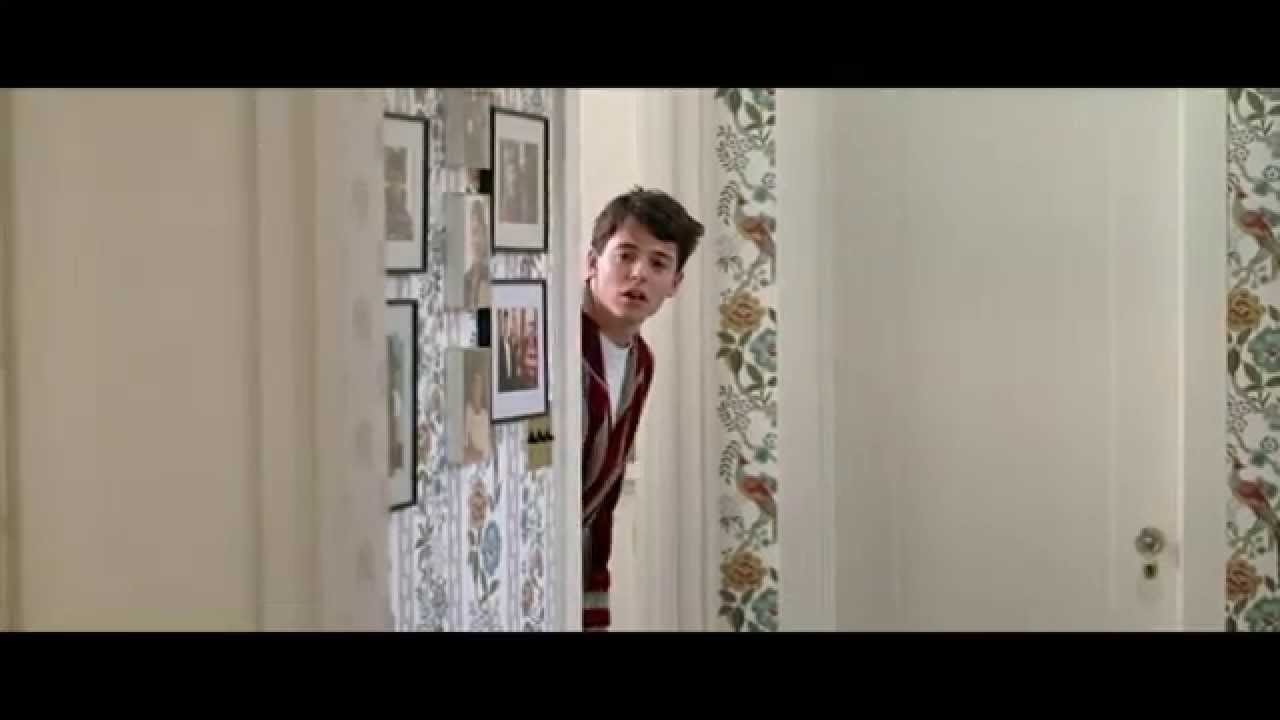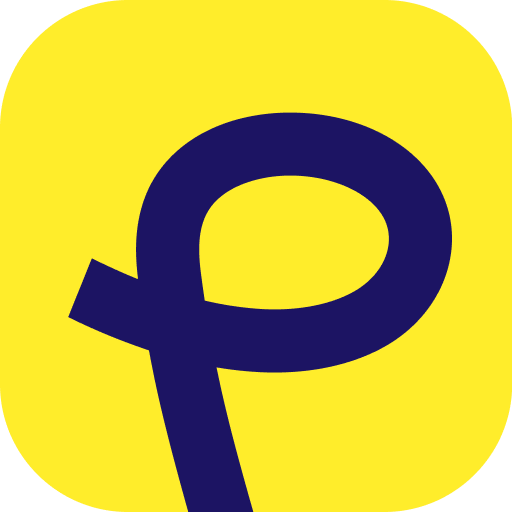How To Start a Podcast For Your Business. And, Why You Should Stop Making Excuses.
Think you need thousands of followers to start a podcast? Think again. Discover why your small audience is perfect for podcasting, and learn how new tools make it easier than ever to share your voice with the world.
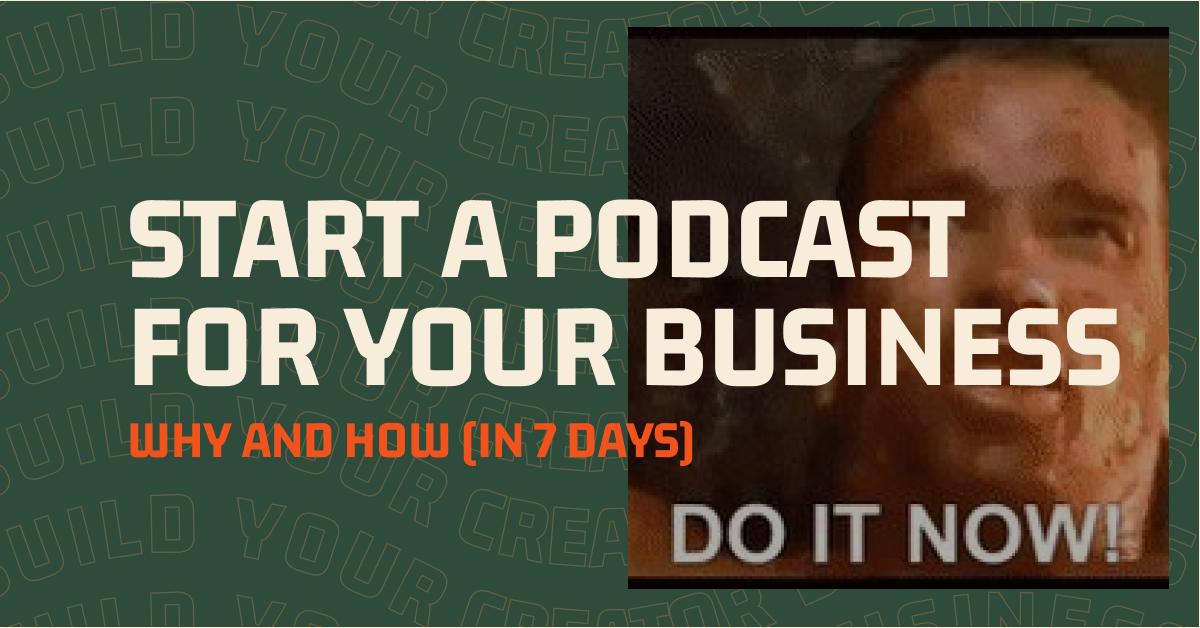
In This Guide:
- Why Small Audiences Win
- Real Stories from "Regular" People
- Busting Common Myths
- Step-by-Step Launch Plan and Kit List
- The Cost of Waiting
- Your Next Steps
Ever felt like your voice is lost in the sea of content creators? Think you need thousands of followers before your message matters? What if I told you that your small audience isn't just enough—it's actually perfect for starting a podcast that makes a real impact?
Let me share something most people won't: You don't need a massive following to start a successful podcast. In fact, your small audience is your secret weapon.
Why Podcasting Breaks Through the Digital Noise
Let's be real for a moment... We're all drowning in content.
Did you know each of us processes about 34 gigabytes of raw information every single day? That's equivalent to about 100,000 words - just in our downtime!
We have more media streaming into our eyeballs than our ancestors had in years. There's a screen in every pocket, on every desk, on wrists, fridges, and bedside tables.
But podcasts... they're different. They duck out of the attention span rat race.
With a podcast, you're listening in to a conversation while you get on with your life. Most people listen:
- While driving
- During their morning routine
- On their commute
- At the gym
- While doing household chores
It's the only form of rich media that lets truckers keep on trucking, joggers keep jogging, and commuters mind the gap. You can get on with your day, and still learn something new, laugh with the host, cry at the story being told, or shake your fist at the latest industry news.
The Intimacy Advantage: Why Small Audiences Pack a Bigger Punch
When's the last time a blog post made you feel genuinely connected to the author? When did a social media post last make you feel like you really knew the person behind it?
Meet Martin and Matt of The Friday Physio Confession Podcast. They started with zero audience but had a simple idea: share the real, human side of being healthcare professionals.
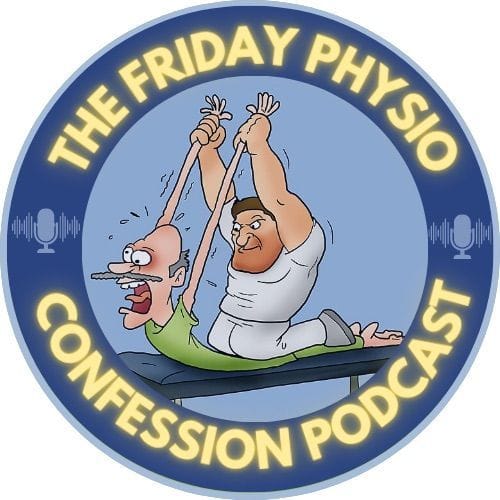
"We wanted to normalize failing and being human," they say. "We wanted a place where we didn't enter a competition of being best, but the struggle in every day clinical life of doing the best we can and learning along the way." Read the full story
That authenticity? It's pure podcast gold.
Blogs, videos, social posts - they get written, re-written and polished until they're completely unrecognizable. Manufactured to fit specific criteria for SEO, sales, marketing, word counts, style guides. It's artificial. Airbrushed. It's fugazi, fugezi, it's not frickin real!
But podcasting? It's different.
Why Listeners Form Deeper Connections Through Audio
As you listen to a podcast, over time you get to know the presenter.
You get to know:
- Their voice
- The way they talk
- Their quirks
- How they pronounce things
- Their sense of humor
- Their passions and pet peeves
In the best shows, you get to hear the mistakes and imperfections that humanize them. You get to know... them. Not just what they're talking about.
63% of podcast listeners have bought something a host promoted on their show. That's not because of fancy marketing - it's because they trust the host. They've built a relationship. They're invested.
The Power of Starting Small
Look at Dr. Elisha Peterson, who started Sevo Sistas. As a black woman in anesthesiology, she saw a problem:
"Many of the educational outlets had 'manels' - panels of all white men talking about the field. Their perspective differed greatly from my own."
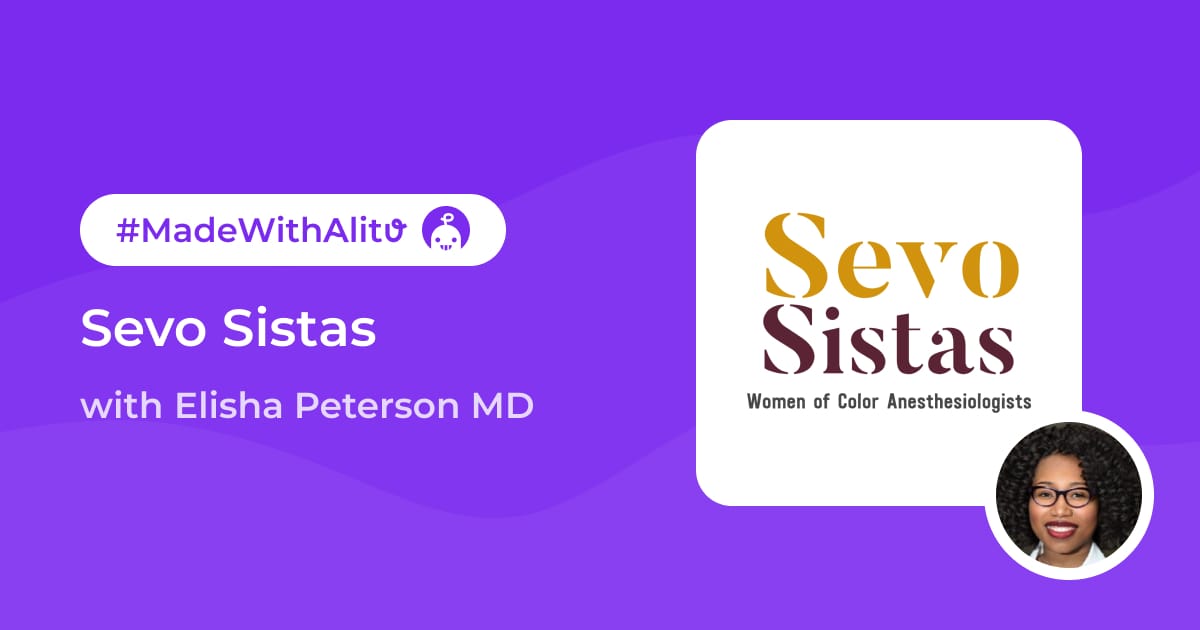
She didn't wait until she had thousands of followers. She didn't wait for the perfect conditions. She started where she was, with what she had, because she knew her voice mattered.
Why 100 Engaged Listeners Beat 10,000 Passive Followers
With a small audience, you can:
- Actually respond to every message
- Create episodes based on specific listener questions
- Build a proper community where everyone feels heard
- Test things out and pivot quickly based on feedback
- Build real, lasting relationships
Write down three people who would benefit from hearing your perspective on your topic. Just three. That's your starting point - not some arbitrary follower count.
Think about this: Would you rather buy a used car from:
Jim, who every week spends 10 minutes telling you funny stories about the AWFUL cars people try to sell him, plus a couple of tips on how to take care of your own car...
Or Bob, who has the best whacky-inflatable-arms person in town and swears blind she's a good runner?
I don't know about you, but I'd vote for Jim. I know he cares about what he does, the products he sells, and I know he cares about my experience after I buy it. Bob might be the most honest used car salesman in the world, but I don't know him.
Busting the BS That's Holding You Back
"I need a big audience first" — FALSE!
This is probably the biggest load of nonsense stopping people from starting. Here's the truth: everyone starts with zero listeners. Even Joe Rogan had a first episode where nobody was listening (hard to imagine now, right?).
Casey and Bethany of Boundless Body Radio started their podcast during the pandemic with exactly zero listeners. Now? They've created over 400 episodes and built a thriving community around health and fitness.
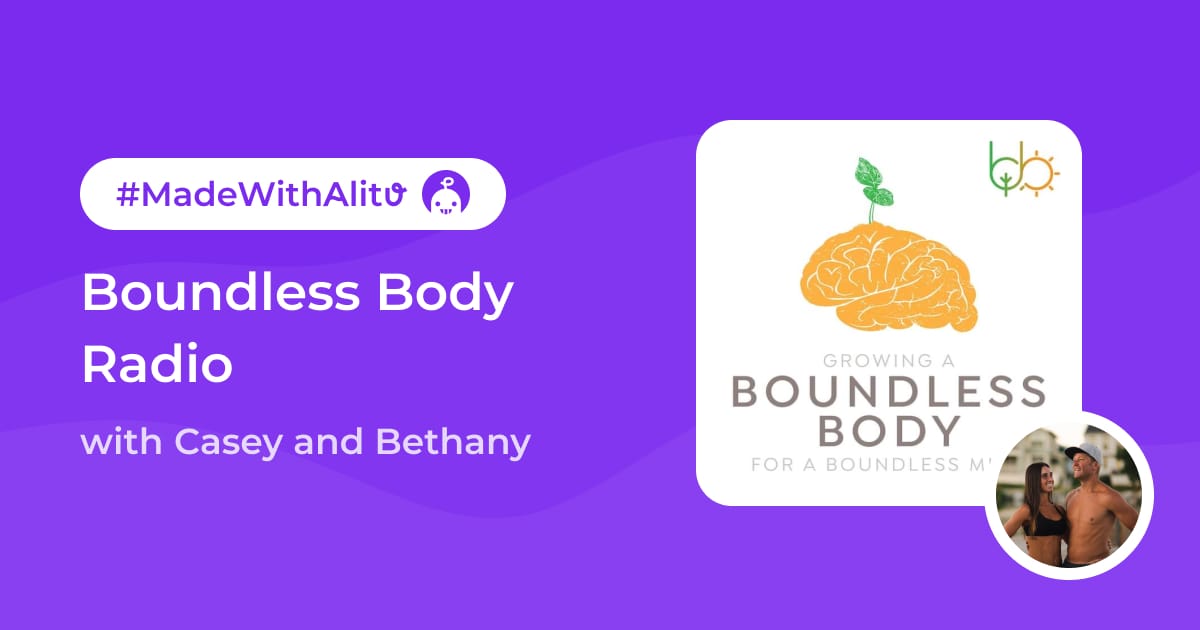
The kicker? They sometimes record interviews on an iPhone in windy environments - not exactly studio quality! But guess what? Their audience doesn't care. They care about the value they're getting.
Starting small gives you superpowers:
- Test different formats without pressure
- Build genuine connections with early listeners
- Actually implement listener feedback
- Perfect your style before a bigger audience arrives
Creator Toolbox is a part of our bigger company, that includes The Podcast Host and Alitu. We're lucky to have a big audience.
But we started it... quietly. Why? Because starting small kinda rocks. We could bang out 10 episodes to start and not really worry about anything other than finding our groove.
We didn't have a blog, we didn't have anything. Some crappy AI generated artwork, a name and a dream. And we're no strangers to podcasting.
We figured it out as we went, but most importantly we're still figuring it out to this day.
Start small. Start 'loud' or 'quiet', start fast or slow. But start, it's the only way to figure it out.
"I need to be REALLY interesting and well-practiced" — FALSE!
Every business is "boring" to someone. But you know what? People love "boring"! Look at all the content these days that's just "day in the life" or "come to work with me" videos. People are fascinated by real stories from real people.
Martin and Matt from The Friday Physio Confession podcast built their whole show around... failing. Seriously. They talk about their mistakes, their struggles, their learning curves.
"We wanted a place where we didn't enter a competition of being best"
Their listeners? They love it because it's real.
"My business/topic is too boring for a podcast" — FALSE!
Look at Diana Kawarsky's Soft Skills Salon. She took something as seemingly "boring" as professional development and turned it into a platform for international voices discussing soft skills in the workplace.
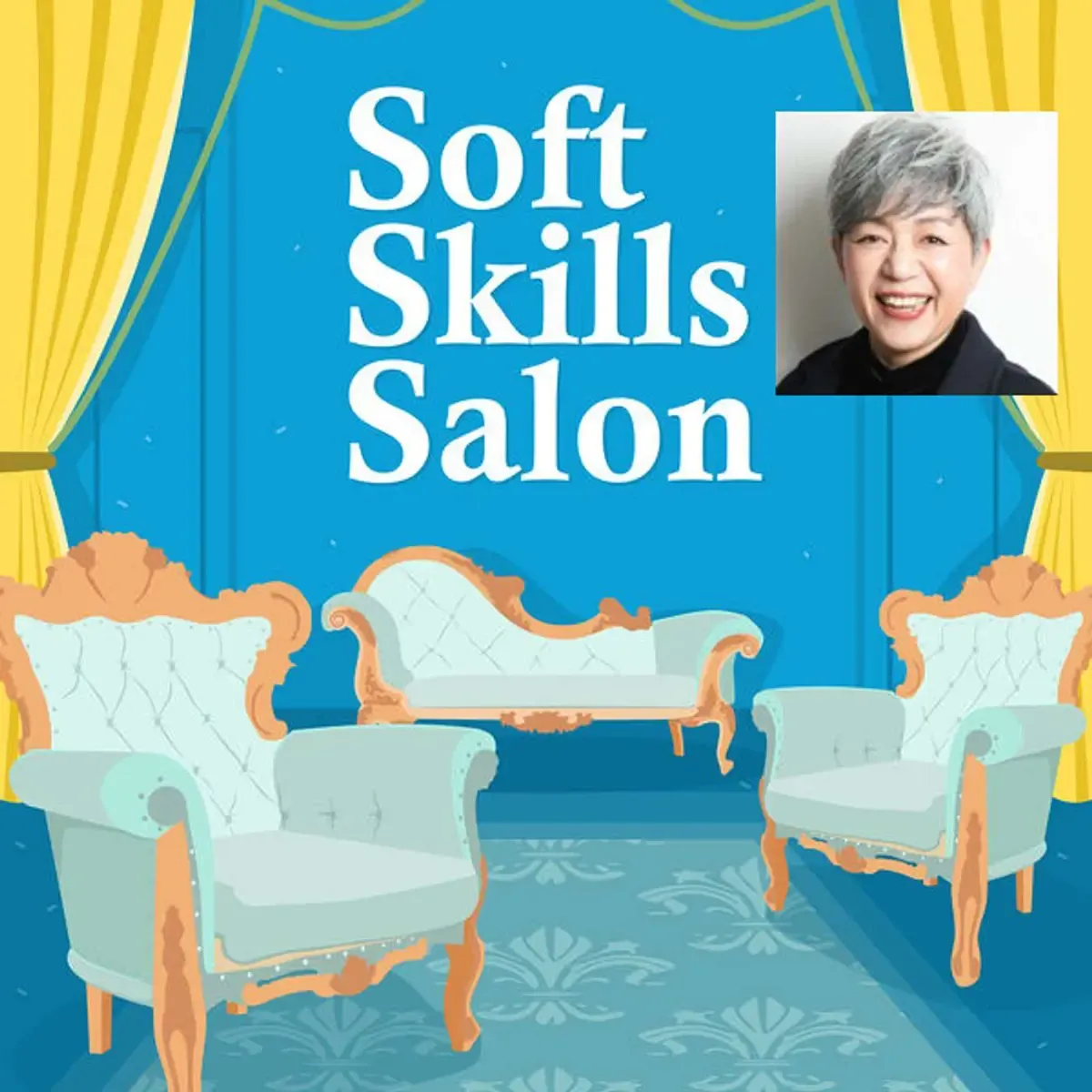
Her secret? She focused on the human side of her topic. The stories. The real-world impact.
Every business has stories worth telling:
- Customer successes
- Behind-the-scenes insights
- Industry trends and changes
- Educational content
- Personal experiences
"I need to be an audio expert" — FALSE!
This might be the most persistent myth in podcasting. Let me be crystal clear: You do NOT need to be an audio engineer to start a podcast.
Dr. Elisha Peterson runs Sevo Sistas while being a practicing anesthesiologist. Her take? "I don't have time to sit and try to learn [a new software] to edit and cut out mistakes... I need something simple and straightforward."
Modern tools have made podcasting as easy as making a phone call. Seriously. If you can use Zoom, you can make a podcast.
The Bare Minimum You Need:
- A decent USB microphone ($50-$100)
- A quiet room (your closet works surprisingly well!)
- A simple recording and editing tool
- Your authentic voice
"I need the best gear" — FALSE!
Remember Casey and Bethany? They've recorded successful episodes on an iPhone. In the wind. And their show keeps growing.
Here's what actually matters:
- Consistency in showing up
- Valuable content
- Authentic voice
- Connection with your audience
Everything else is just window dressing.
"I need lots of time" — FALSE!
Elizabeth runs the Absolute Marketing podcast like it's a shot of espresso. Her episodes? Between 2 and 10 minutes long. That's it. No fluff. Just pure, valuable knowledge.
She records them in batches, spending about an hour to create a month's worth of content. One hour a month. You spend longer than that scrolling Instagram!
"I need to learn audio editing" — FALSE!
This is where modern technology is your friend.
(inhale) Prepare for shameless plugging...
(exhale) Tools like Alitu handle all the technical stuff automatically:
- Clean up your audio
- Remove background noise
- Balance volume levels
- Add your music
- My personal favourite: Never need to learn what a LUF is
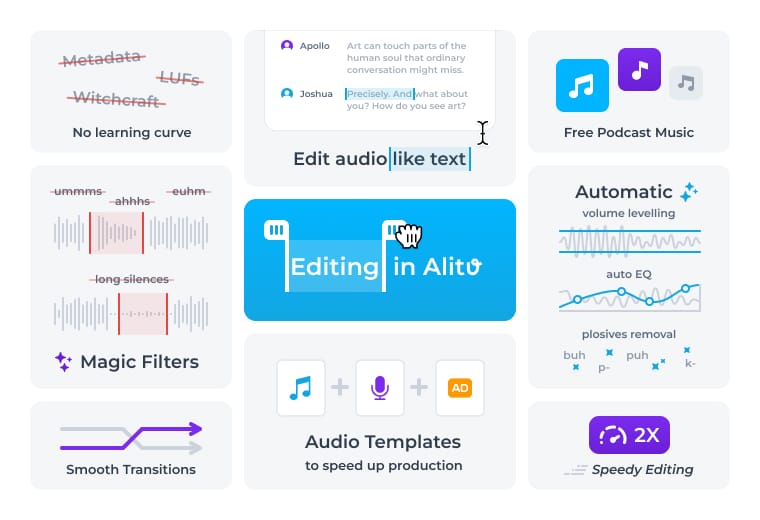
This is the best review we've ever had
Yeah I love this tool so much. I don't know why more people aren’t using it. I mean why do you keep fucking around sorry, excuse my language, but In GarageBand and Audacity. To me that's very complicated. And my brain explodes. When I open the tool my brain explodes. And yeah, Alitu just gives me so much peace. It's so easy. Yeah. Yeah.
Ann Alice De Schoenmaeker, I promised you I'd share this quote
The REAL Truth About Starting a Podcast
You don't need:
- A massive following
- Perfect equipment
- Years of experience
- Technical expertise
- Loads of time
What you DO need:
- A desire to share valuable content
- Consistency in showing up
- Your authentic voice
- A simple technical setup
✍️ Write down your biggest fear about starting a podcast
✍️ Look at how we've addressed it above
✍️ Ask yourself: Is this fear real, or is it just an excuse?
Can You Really Afford to Wait?
Let's flip the script for a minute. Instead of asking if you're ready to start a podcast, let's ask: Can you afford NOT to?
The Early Internet Days (Sound Familiar?)
The last time people felt this way about a big new medium was in the 90s when the internet started kicking off, Netscape came out, and suddenly it felt like everyone was starting to use the internet. Hundreds of websites were being created every day.
I hadn't even been born yet, but I bet a bunch of you remember the internet in the early days. It was something used by geeks, hackers and academics. A fad that would blow over.
Think About This:
Netscape launched in 1992. Not long after:
- Jeff Bezos started Amazon
- CNN launched one of the first mainstream news websites
- Everyone said they were too late to the party
Now Jeff's building rockets, CNN is a digital powerhouse, and we're all kicking ourselves for not buying Amazon stock.
The point here isn't just to complain about Jeff (though that's always fun). It's to point out how quickly new media can turn from "fringe novelty" to "business crucial."
The Podcasting Gold Rush Is Happening Now
Globally there will be 500 million podcast listeners by 2024. That's 23.5% of all internet users.
While the number of podcasts is increasing, the demand is rising even faster. And unlike blogging or social media, there are still countless niches with zero content. Imagine finding a topic on YouTube with no competition!
The Real Cost of Waiting
Here's what happens when you wait:
Lost Opportunities
- The best podcast names in your niche? Taken
- Those dream guests you want to interview? Already regulars on other shows
- Your competitors? Building relationships with YOUR future audience
- That intimate, authentic connection with early listeners? Someone else has it
Lost Time
Every day you wait is:
- One more day your message isn't being heard
- One more day your expertise stays locked in your head
- One more day your competitors build THEIR audience instead
- One more day of missed opportunities to connect, grow, and make an impact
Remember Dr. Elisha Peterson? She saw a gap in her field - no podcasts speaking to women of color in anesthesiology. She could have waited until she felt "ready." Instead, she started. Now she's the voice she wished she had when she was starting out.
The Attention Gap Is Closing
Right now, podcasting offers something rare in digital media: attention. While social platforms fight over milliseconds of focus, podcast listeners give hours of their time to hosts they trust.
Your Current Advantages:
- Less competition than other media
- More engaged audiences
- Longer attention spans
- Higher trust levels
- Better conversion rates
But this window? It's closing. Fast.
The Perfect Time to Start Was Yesterday
Remember how we talked about Jim, our used car salesman with the podcast? Let me tell you what happens in two different scenarios:
Scenario 1: Jim Waits
- Spends months "getting ready"
- Keeps thinking about the perfect name
- Worries about his equipment
- Meanwhile, another dealer starts a show
- By the time Jim launches, his competitor owns the space
Scenario 2: Jim Starts Today
- Records his first episode with basic equipment
- Shares real stories about cars
- Builds trust with his audience
- Becomes THE voice in his local market
- Has 50+ episodes when his competitor decides to start
Which Jim do you want to be? The one who "got ready" or the one who got started?
The Truth About Perfect Timing
There's never a perfect time to start. But here's what successful podcasters know:
- The best time to start was yesterday
- The second best time is today
- The worst time is "someday"
Look at the podcasters we've mentioned:
- Casey & Bethany started during a pandemic
- Martin & Matt started despite being "boring" physios
- Elizabeth started with just 10-minute episodes
They all have one thing in common: They started.
It's a cliche but I tell myself this often: every overnight success starts with many days of saying "fuck it" and doing something again, and again, and again.
Your Window of Opportunity
Right now, you have:
- Less competition than ever again
- Tools that make it easier than ever
- Audiences hungry for authentic content
- The chance to own your niche
But tomorrow? Next month? Next year? Those advantages start disappearing.
Don't let this be another "I should have started sooner" story. In the next section, we'll break down exactly how to start your podcast in the next 7 days - no experience needed.
Your 7-Day Podcast Launch Plan
Alright, enough theory. Let's get you started. Here's how to launch your podcast in the next 7 days - even if you're starting from zero.
By day 6 or 7 you'll have launched your show. By that I mean you'll be able to find yourself in Apple Podcasts - pretty big milestone!
That first episode is your commitment. Once you do that, you're on the hook. People will find that show, and you'll tell everyone about it.
Once they listen, they'll expect more.
So only start if you're ready to commit, and have fun with it. 47% of podcasts don't make it past 3 episodes. And it's because they don't plan, commit, or they get themselves tangled and overcomplicate the whole thing.
You've got the commitment in you if you read this far.
So let's get started, I'll help you with the rest.
Bonus: the landing page has Colin's face on it
Get our StartPod email course ($FREE)
Day 1: Find Your Thing & Name It
Step 1: Define Your Show
You know that moment at networking events when someone asks what you do, and you actually get excited telling them? That's your thing.
1. What could you talk about for hours?
2. What do people always ask your advice about?
3.What problems do you help solve?
Your podcast lives in those answers.
Alitu Showplanner uses some AI devilry to help you turn a rough idea into a clear plan. Just turn up with an idea and answer some questions.
We'll generate a personalised launch kit: including a name generator, trailer script, episode ideas, audience and a little feedback on the idea.
We don't save it anywhere, so download the PDF when you're done.
Give it a try (feedback welcome)
Step 2: Name Your Show
Keep it simple and searchable. You've got two solid options:
1. The Descriptive Name
- Clear what it's about
- Easy to find
- Examples:
- "The Australian Finance Podcast"
- "Ask a Cycling Coach"
- "Creator Toolbox"
2. The Clever Name + Description
- Creative but clear
- Examples:
- "Beyond the Bump: A New Parent's Guide"
- "Rest is Politics: Making Sense of the News"
- "PodCraft: How to Podcast & Craft a Fantastic Show"
Day 2: Plan Your First Three Episodes
Episode 1: Your Story & Why
- Introduce yourself
- Share your journey
- Explain why you're starting this show
- Tell listeners what to expect
Episode 2: Tackle a Big Problem
- Address a major pain point
- Share specific solutions
- Include a real example or story
Episode 3: Bust a Common Myth
- Challenge conventional wisdom
- Share your unique perspective
- Back it up with experience
Remember Martin and Matt from The Friday Physio Confession? They built their whole show around sharing what goes wrong. No pretense of perfection - just real talk about real experiences.
Day 3: Set Up Your Simple Tech Stack
Here's the beauty of modern podcasting: you can start with just three things:
1. A Microphone
- Budget Pick: Your phone (seriously!)
- Recommended: Samson Q2U ($60-70)
First port of call: High-end smartphone microphones and laptops have great microphones these days. If I were you, I'd record my first episode with that.
But if you'd rather have a real mic, or don't have a high-end device already, then this is the only microphone you need to know about.
The Samson Q2U is indestructible, it'll 'grow with you', and it's simply the best bang-for-buck you'll find.
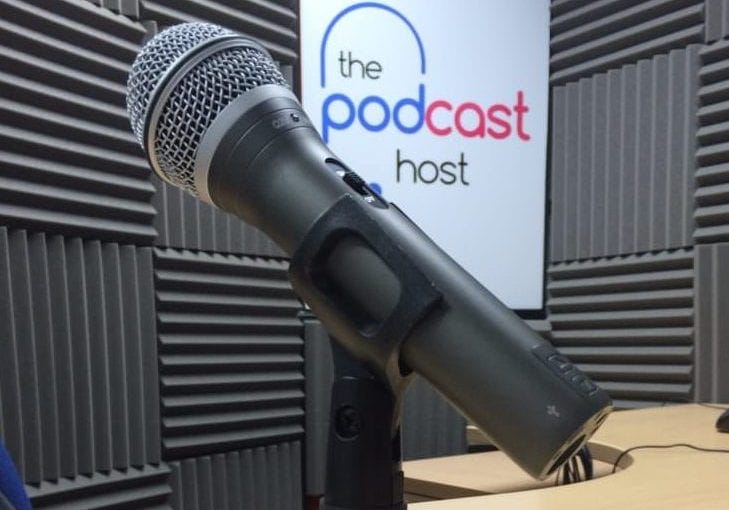
We rated the Q2U 5/5 stars over at thePodcastHost.com, Matthew had this to say:
Being a dynamic microphone with a cardioid pickup pattern, it’s ideally suited to picking up vocals while rejecting much of the sounds around and behind it. The Q2U does a better job of this than many other dynamic-cardioid mics.
It also performs well with handling noise. It’s always preferable to mount your mics in a boom arm or stand, but it might be easier to walk around holding the mic if you’re doing some on-location interviews. The only mic I’ve used that ‘handles’ better than the Q2U is the Shure SM58.
This is all to say: it'll make you sound real good, and it's all you need for a while.
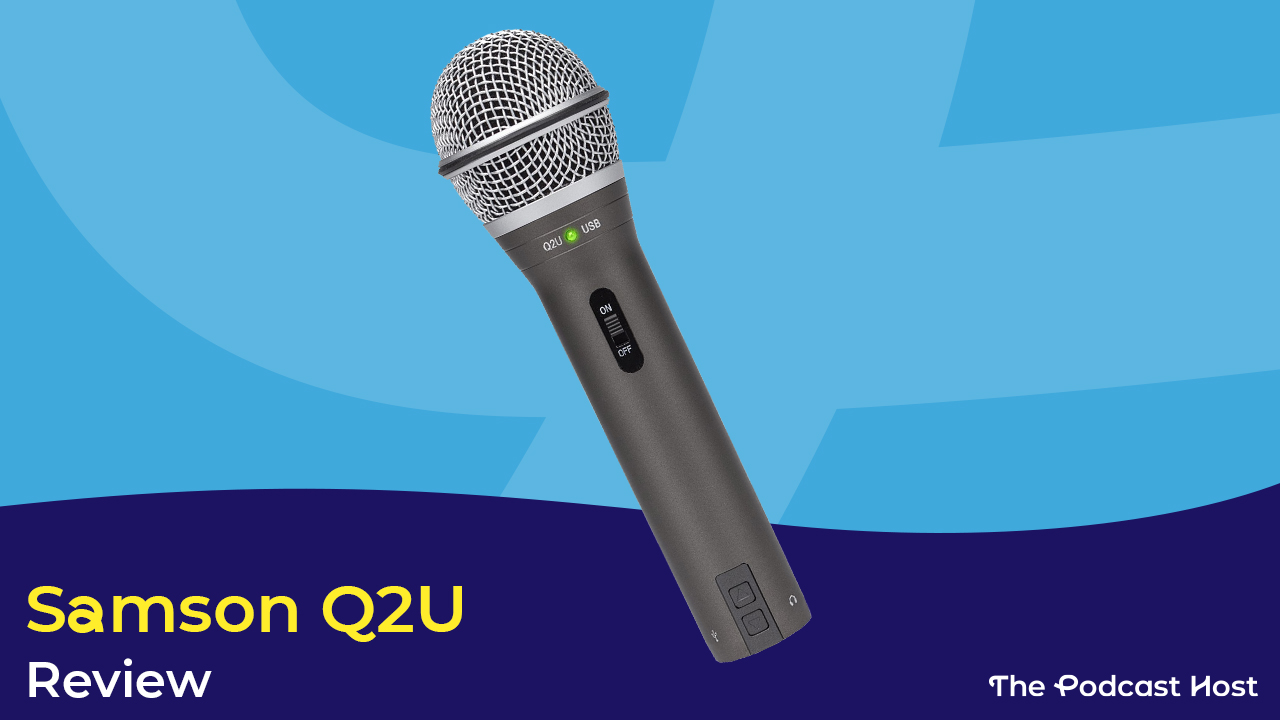
2. Recording & Editing Software
If there were a better tool for you, I'd recommend it. But fact is, we built Alitu for people who want to START, and create, and publish.
If you're starting a podcast for your business, then the $38 subscription is:
a) Cheaper than the handful of separate tools you'd need to get
b) Way cheaper than outsourcing
It's really your whole workflow, fluff-free and automated.
- Record straight in the app
- Edit by cutting out text
- Automatic cleanup and processing
- Direct publishing to podcast platforms
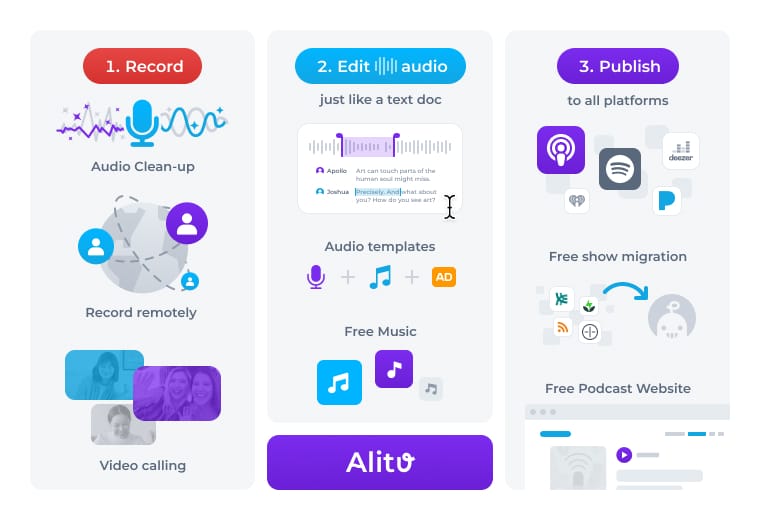
Alitu does everything that will stress you out and prevent you from starting and sticking to it. We made it for that reason, and we hope that one day, you graduate from it, take on a team, hire a producer, and get all the other help you could get.
But you don't need that today. You just need to start.
"I'm a practicing anesthesiologist - I don't have time to learn complex software. With Alitu, I can record, edit, and publish without needing a tech degree." - Dr. Elisha Peterson, Sevo Sistas Podcast
Use code "CREATORTOOLBOX" for a 7-day trial and 50% off your first month of Alitu
3. A Quiet Space To Record
- Early morning or late night in a room with soft things (beds, sofas)
- Closet with clothes (great sound dampening!)
- Car (surprisingly good acoustic environment)
- In a pinch, and this does sound crazy, you can use a cat (or dog) bed as a vocal booth
All of these are ideal, just do the best you can.
Day 4: Record Your Test Episode
Today's goal: Record a 5-minute test episode. That's it.
Quick Format:
- "Hey, welcome to [Show Name]"
- One-sentence explanation of your show
- Share one quick tip or story
- Tell listeners what's coming next
- Quick goodbye
Put a photo of someone you're comfortable talking to behind your mic. Talk to them, not the microphone.
Day 5: Record Your First Real Episode
Before You Start:
- Have water nearby
- Quick bullet points (not a script!)
- Turn off phone notifications
- Take a deep breath
While Recording:
- Speak like you're talking to a friend
- It's okay to mess up (you can edit later!)
- Focus on being helpful, not perfect
Day 6: Simple Editing & Polish
The Minimal Editing Approach:
- Remove major mistakes
- Add intro/outro music
- Balance volume levels
- Export and you're done!
Why Alitu Makes This Easy:
- Drag-and-drop episode builder
- Automatic volume balancing
- Built-in music library
- One-click publishing
Day 7: Launch! 🚀
The Simple Launch Checklist:
- Upload your episode
- Write a clear description
- Add show artwork
- Submit to podcast directories
- Tell at least one person!
Quick Wins:
- Text 3 friends about your show
- Post in one relevant Facebook group
- Email your existing customers/clients
- Share one social media post
Keeping the Momentum
Week 2 and Beyond:
- Record one episode per week
- Batch record when possible
- Keep episodes short to start
- Focus on consistency over perfection
Remember Elizabeth's "Absolute Marketing" podcast? She records a month's worth of short episodes in just one hour. That's totally doable!
Where will you be a year from now?
Let's have an honest moment here. You've read this far for a reason. Something in you knows it's time to start sharing your voice with the world.
Two Paths Lie Ahead
Path 1: The "Maybe Later" Path
- Still thinking about starting
- Still watching others build their audiences
- Still keeping your valuable knowledge to yourself
- Still saying "I'll do it when [insert excuse here]"
- Still wondering "what if?"
Path 2: The "I Started" Path
- 52 episodes under your belt
- A growing, engaged audience (even if it's small!)
- Real relationships with listeners who value your voice
- Opportunities you hadn't even imagined
- Pride in knowing you actually did it
The Permission You've Been Waiting For
Maybe you've been waiting for:
- The perfect time (it doesn't exist)
- More followers (you don't need them)
- Better equipment (your phone works fine)
- More confidence (it comes from doing)
- Someone to say "yes, you should"
Here it is
This is your official permission slip to start your podcast. Right now. Today. With whatever you have. Signed, everyone who started before they felt ready. Including me.
What's Really Stopping You?
Let's tackle those final doubts:
"But what if nobody listens?"
Then you'll have practiced speaking, sharing your ideas, and creating content. Win!
"But what if people judge me?"
They're not thinking about you nearly as much as you think about you. Promise.
"But what if I make mistakes?"
You will! And then you'll learn from them. Like every successful podcaster before you.
"But what if..."
Stop. Just start.
The Secret Nobody Tells You About Podcasting
Want to know what successful podcasters wish they'd known at the start?
The hardest episode to make is your first one. Everything gets easier after that.
Why? Because once you've done it once, the mystique is gone. It becomes... normal.
This Is Your Bare Minimum Start
You don't need:
- A professional studio
- Expensive equipment
- Technical expertise
- A huge following
- Perfect scripts
You just need:
- A way to record (your phone works!)
- A simple editing tool (Alitu handles this)
- Something to say (you already have this)
- The courage to start (we're giving you this right now)
Okay, Now Take Action
Do this right now:
- Open your phone
- Open voice memos
- Record yourself talking about your topic for 60 seconds
- Listen back
Congratulations! You've just created your first piece of audio content.
Final Words: Make Your Choice
Remember the internet analogy from earlier? Right now, you're standing at a similar crossroads.
You can be the person who:
A) Watches others build their audiences while you "get ready"
B) Takes imperfect action and starts building something amazing
Because in 12 months, you'll either have a podcast...
Or you'll have an excuse.
Which will it be?
Ready When You Are
Every single podcast you love started with someone saying "Okay, fuck it."
It's your turn.
If you actually start your podcast after reading this, tell me. Join the site for free, and leave a comment. I'll respond to every single one.
What are you waiting for?
